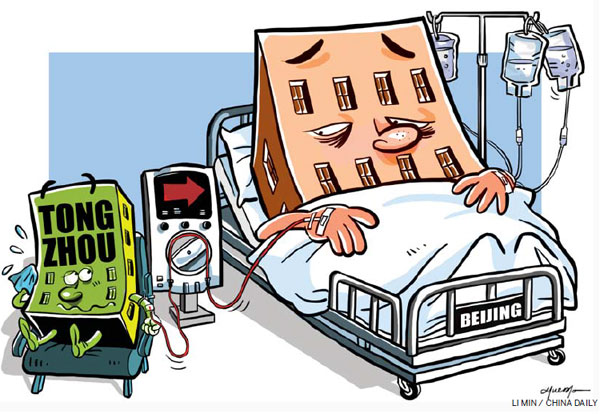 |
BEIJING - China has set goals for more coordinated Beijing-Tianjin-Hebei?(or Jing-Jin-Ji in their abbreviations) regional development in the next 15 years mainly by transferring non-essential functions of Beijing as the national capital to neighboring areas, an official document said.
By 2017, major breakthroughs in transportation integration, environmental protection and industrial upgrading in the integrated region will be achieved, said the document issued by the office of a leading group for the coordinated development of the Beijing-Tianjin-Hebei area on Sunday.
The document revealed key information of an outline of the Beijing-Tianjin-Hebei integrated development program, which was approved by the Political Bureau of the Communist Party of China (CPC) Central Committee in April.
Beijing will become "the national center of political, cultural, and international exchange activities" as well as a technological innovation center, said the document.
Tianjin municipality will be a national research and development base for advanced manufacturing industry, a shipping hub for north China, a demonstration area for financial innovation, and an experimental area for further reform and opening up.
Hebei province will be an important national base for trade and logistics, an experimental area for industrial transition and upgrading, a demonstration area of modern urbanization and coordinated development of urban and rural areas, and an ecological buffer zone.
The strategy will see the relocation of nonessential functions from Beijing, which will help adjust the regional economic structure, nurture new growth sectors, and address problems of megacities such as overpopulation, pollution, and resources scarcity.
The medium-term target of the strategy is, by 2020, to control the permanent population of Beijing within 23 million, and to relieve Beijing's "urban illnesses" such as air pollution and congestion.
Social development gaps between different areas would be reduced as a result of better delivery of public services in the region.
In the long term, the strategy aims to form an integrated region of Beijing-Tianjin-Hebei, with better economic structure, cleaner environment and improved public service ability. The integrated region will become an important region with strong competitiveness and influence in the world, said the document.
Priority will be given to traffic management, environmental protection, energy security and industrial upgrades. Public services will be improved and the area will be created into a better place for foreign businesses.
Innovation will be encouraged, and market forces will play a bigger role in utilizing the resources in the region.
As China's economy slows, the program is designed to add momentum to growth.
Some major projects have already been revealed, including a new 80-billion-yuan airport to be built in southern Beijing on the border with Hebei.
